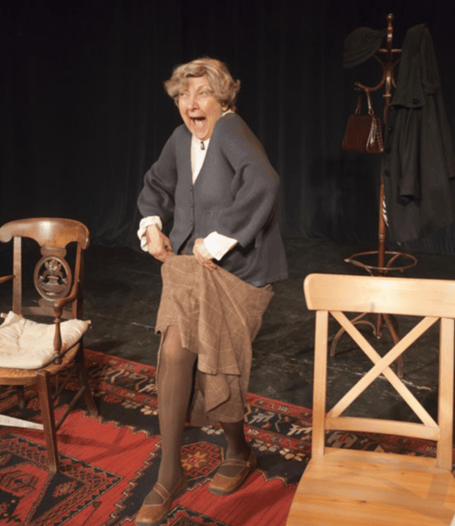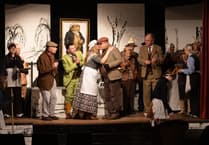A warm and welcoming stage set greeted the audience at Selborne Village Hall for ‘Flo' Smith Now and Then.
This is a remarkable story of survival from a time when parts of London still had the atmosphere of village communities.
In every detail the set recreated the cosy and warm living room of writer Christopher Saul’s paternal grandmother, the storyteller.
Christopher recorded his Nan's life experiences growing up and working in London for his dissertation as a drama student. It earned him a distinction.
It was a truly engrossing account of danger, tenacity and courage played out in the living room of a fun grandparent, played effortlessly by Ursula Mohan.
There were vivid recollections of the life of 'Flo' Smith, through early years governed by a dictatorial father and the effects of two world wars on her life and the city.
London was a familiar friend, particularly Soho and Dean Street, through Flo's Edwardian school years and development into a young woman in a family controlled by a dominating father and a mother who preferred keeping the peace to contradicting him.
A strong character, Flo soon found ways to get round being locked in, or out, via the scullery.
She was born during the Boer War and experienced two world wars, and the spirit of the village-like communities in London at that time shone through.
Flo described hearing doodlebugs coming overhead, then the silence which meant an imminent explosion. And being practically dragged into an underground shelter to endure the destruction going on above, emerging into a completely altered streetscape.
All Flo's accounts of her war experiences were given with matter-of-fact simplicity, pausing to get up from her chair, go to the table and pour another cup of tea.
Flo worked hard as a hospital cleaner and escaped to the local dance with her friends whenever she could. It was there she met her husband to be.
But he was wounded by mustard gas in Egypt then cared for by Flo at home, with no NHS and little food. Pig's trotters featured regularly on the menu.
Christopher described the recording of his Nan's accounts as being fuelled always by cups of tea, laughter at the sometimes funny aspects of Flo's life, then the stoic acceptance that this is life, it is ours to live and to manage as we can.
Worry and fear, grief, lack of money - so much of Flo's account could be translated into our modern lives.
Flo described Winston Churchill as a pig for sending police to break up a strike violently in 1926.
Her husband Bill must have been typical of many who smoked during the war, and must have struggled to stop after the mustard gas left him with an asthma-type condition.
It was touching to learn he tried switching to herbal cigarettes, which Flo was trying to buy for him on his last day. There was no war compensation, no NHS, no way to phone for help.
Flo did not cry for three months. She carried on working, cleaning rubberised hospital floors that had to be washed without rubber gloves. The pay was £2/5/- per week (£2.25) for a ten-and-a-half-hour day, eventually rising to £5 per week. And Stormy Weather was on the radio.
Christopher, Ursula and producer Giles Shenton were rewarded with explosive applause at the end.
Gwyneth Rushton





Comments
This article has no comments yet. Be the first to leave a comment.